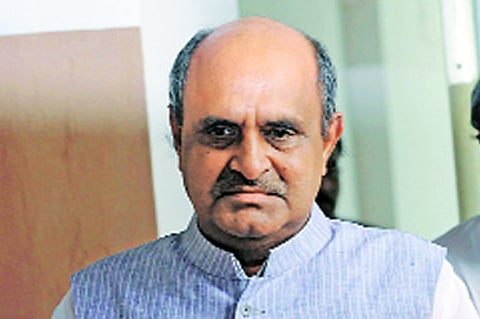

K C Tyagi, special advisor and chief spokesperson of Janata Dal (United), spoke to Preetha Nair about the political implications of the recently published caste survey. Excerpts:
Bihar is the first state to conduct a caste survey and release its results. What are the implications?
Chief Minister Nitish Kumar has consistently championed social justice. A majority of opposition parties, as well as NDA allies, support a nationwide census following Bihar’s survey. The upcoming state elections will primarily revolve around the caste census, setting the tone for the 2024 Lok Sabha election. CM’s of Congress-ruled Rajasthan and Chhattisgarh have also announced their intention to conduct caste surveys. If Congress succeeds in Madhya Pradesh, they will follow suit. In Telangana, both Congress and the ruling BRS government favor caste surveys. BJP is on a back foot. They are going to lose all the elections.
Prime Minister Modi said that poverty is the biggest caste in India, and Opposition parties are trying to divide society.
We strongly oppose the Prime Minister’s statement, where he claims discrimination based on his backward caste. India is undoubtedly a caste-based society, and reservation policies aim to ensure adequate representation for backward classes. The Mandal Commission used caste as a criterion for reservation. However, we disagree with the PM’s notion that poverty transcends caste, although poverty exists across all castes..
The demand for a caste census is being seen as Mandal vs. Kamandal politics.
I would say that we are advocating for the politics of social justice. In Bihar, this isn’t just a caste census; it also records economic and social conditions. The Prime Minister makes statements to divert attention from real issues. The BJP claims to have 27% backward caste ministers in their cabinet and 86 OBC MPs, but they have backtracked now. Nitish Kumar’s caste survey has disrupted the BJP’s 2024 plans. Even the UP and Bihar allies of the NDA have demanded a caste census. So, the BJP is isolated within the NDA, as all political outfits in the country favor caste-based population counting.
There is a fear that the demand for a caste census will bring back Mandal politics.
It’s not the same as in 1990 when PM V.P. Singh accepted the Mandal Commission report, which recommended 27% reservation for OBC candidates at all levels of services. The landscape has completely changed since then. The then BJP President L.K. Advani started the rath yatra to capitalize on protests against the reservation bill. Late Prime Minister Rajiv Gandhi made a scathing speech in Lok Sabha against reservation. However, in 1992, the Supreme Court gave a landmark judgment that caste could be a factor in identifying backward classes and recognized the validity of 27% reservation.
South will be severely affected by the loss of 100 seats in the 2026 delimitation exercise due to proportional population rights?
Reports suggest the government plans to fix a population of 20 lakh people for one constituency after delimitation. If this happens, Southern states will lose Lok Sabha seats due to their lower population. Largely populated North Indian states will benefit with more seats. Hence, there should be a mechanism to address the issue.
The PM also raised the issue of minority rights not being protected in the caste survey:
The Mandal Commission has adequately provided quotas for 90% of Muslims belonging to the backward class. Therefore, the PM’s statement is incorrect.
The BJP says that CM Nitish Kumar is trying to appease OBC Kurmi caste, to which he belongs.
This is false. Nitish Kumar advocates for EBC, BC, and other sections of society. He has made numerous efforts in the past to conduct a caste survey. In 2018 and 2020, the state assembly passed unanimous resolutions in favor of a caste census. Two years ago, when an all-party delegation met the PM along with BJP leaders, he expressed his inability to conduct a caste survey. However, the Nitish Kumar government announced its commitment to the plan. Bihar was the first state to implement the Karpoori Thakur formula of sub-quosta within the OBC quota in 1978, providing reservations for Extremely Backward Castes and Backward Caste women in government jobs and educational institutions.